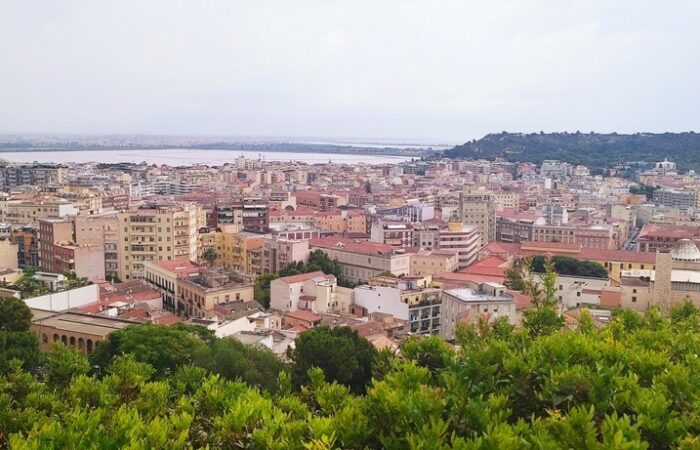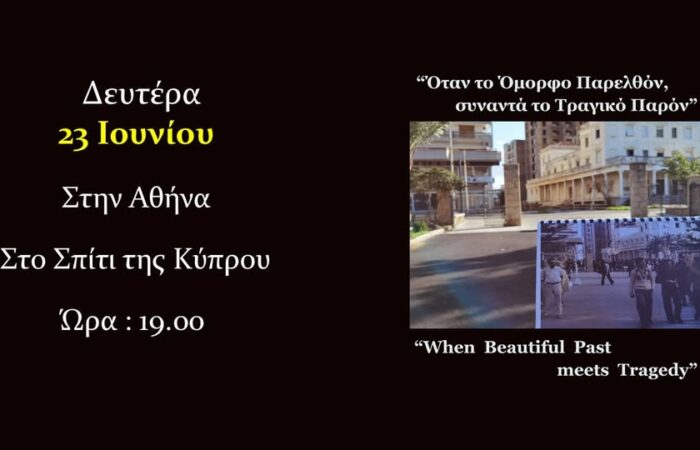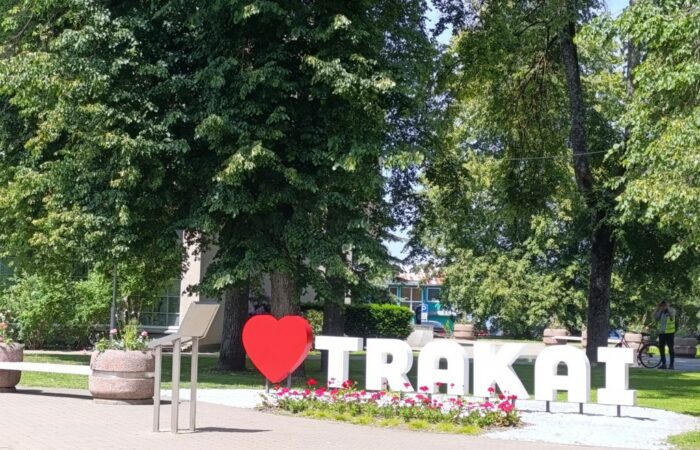A photo exhibition about Famagusta entitled “We are together for one homeland, for a common future” by Tasos Demetriades, member of our Association, will be presented in Athens, Greece. Ένα από τα τραγικά και πολλά λυπηρά αποτελέσματα της Τουρκικής εισβολής το 1974 είναι η ιστορία της Αμμοχώστου και συγκεκριμένα της γειτονιάς των Βαρωσίων. Κατά τη διάρκεια της Τουρκικής εισβολής στην Κύπρο το 1974 και κάτω από τον φόβο ακροτήτων οι κάτοικοί της δυστυχώς αναγκάστηκαν να την εγκαταλείψουν. Η πόλη τέθηκε υπό τουρκικό έλεγχο. Οι κάτοικοι ήλπιζαν να γυρίσουν πίσω στα σπίτια και στις περιουσίες τους μόλις η κατάσταση ηρεμούσε. Δυστυχώς όμως ο τουρκικός στρατός την περίφραξε και απαγόρευσε την είσοδο στους πάντες εκτός του προσωπικού του τουρκικού στρατού και των Ηνωμένων Εθνών. Από τότε παραμένει όμηρη υπό την κατοχή των τουρκικών Ενόπλων Δυνάμεων. Το 2020, η είσοδος στην πόλη άνοιξε μερικώς για τον κόσμο μόνο για επίσκεψη.
Ένα από τα τραγικά και πολλά λυπηρά αποτελέσματα της Τουρκικής εισβολής το 1974 είναι η ιστορία της Αμμοχώστου και συγκεκριμένα της γειτονιάς των Βαρωσίων. Κατά τη διάρκεια της Τουρκικής εισβολής στην Κύπρο το 1974 και κάτω από τον φόβο ακροτήτων οι κάτοικοί της δυστυχώς αναγκάστηκαν να την εγκαταλείψουν. Η πόλη τέθηκε υπό τουρκικό έλεγχο. Οι κάτοικοι ήλπιζαν να γυρίσουν πίσω στα σπίτια και στις περιουσίες τους μόλις η κατάσταση ηρεμούσε. Δυστυχώς όμως ο τουρκικός στρατός την περίφραξε και απαγόρευσε την είσοδο στους πάντες εκτός του προσωπικού του τουρκικού στρατού και των Ηνωμένων Εθνών. Από τότε παραμένει όμηρη υπό την κατοχή των τουρκικών Ενόπλων Δυνάμεων. Το 2020, η είσοδος στην πόλη άνοιξε μερικώς για τον κόσμο μόνο για επίσκεψη.
Εφόσον κανείς δεν κατοικεί στην περιοχή και δεν έχουν γίνει επισκευές, πολλά κτίρια καταρρέουν και σε ορισμένες περιπτώσεις, το περιεχόμενό τους έχει λεηλατηθεί με τα χρόνια. Η φύση αναμορφώνει την περιοχή, καθώς τα μέταλλα σκουριάζουν, τα παράθυρα σπάζουν και τα φυτά προχωρούν τις ρίζες τους σε τοίχους και πεζοδρόμια. Το Ευρωπαϊκό Δικαστήριο των Ανθρωπίνων Δικαιωμάτων επιδίκασε ποσά αποζημιώσεων σε οχτώ Ελληνοκύπριους λόγω στέρησης των σπιτιών και των περιουσιών τους ως αποτέλεσμα της εισβολής του 1974.
Δύο ψηφίσματα του Συμβουλίου Ασφαλείας του ΟΗΕ, 550 το 1984 και 789 το 1992, καλούσαν την Τουρκία να παραδώσει την πόλη στον ΟΗΕ για να επανεγκατασταθεί από τους νόμιμους κατοίκους της, αλλά χωρίς αποτέλεσμα, καθώς η τουρκική πλευρά επέλεξε να τη διατηρήσει ως διαπραγματευτικό χαρτί. Αργά ή γρήγορα η πόλη θα πάρει πίσω την ψυχή της και θα αρχίσει να ανθίζει ξανά με τους προοδευτικούς κατοίκους της. When the Ottomans occupied Cyprus in 1571, they did not allow the Christians to live in the old Famagusta city, that is within the Venetian walls. The Christians then began to settle outside Old Famagusta, further south, creating gradually the suburb of Varosia, or Varosi. This area became the new Famagusta, which experienced significant economic growth and tourist development until 1974. It was even a favorite destination for celebrities such as Elizabeth Taylor, Richard Burton, Raquel Welch, and Brigitte Bardot.
When the Ottomans occupied Cyprus in 1571, they did not allow the Christians to live in the old Famagusta city, that is within the Venetian walls. The Christians then began to settle outside Old Famagusta, further south, creating gradually the suburb of Varosia, or Varosi. This area became the new Famagusta, which experienced significant economic growth and tourist development until 1974. It was even a favorite destination for celebrities such as Elizabeth Taylor, Richard Burton, Raquel Welch, and Brigitte Bardot. A resort that prior to becoming a bargaining chip in a game of geopolitical chess was the Mediterranean’s most glamorous tourist destination. It was here, along the fabled sandy beach, that Richard Burton and Elizabeth Taylor played. It was here that Paul Newman enjoyed the famously emerald waters when he spent the summer of 1960 filming the epic movie Exodus. And it was here that Europe’s cosmopolitan elite gravitated.
A resort that prior to becoming a bargaining chip in a game of geopolitical chess was the Mediterranean’s most glamorous tourist destination. It was here, along the fabled sandy beach, that Richard Burton and Elizabeth Taylor played. It was here that Paul Newman enjoyed the famously emerald waters when he spent the summer of 1960 filming the epic movie Exodus. And it was here that Europe’s cosmopolitan elite gravitated.
One of the most tragic and sad results of the Turkish invasion in 1974 is the story of Famagusta city, and, specifically, the neighbourhood of Varosha. In the 60s and 70s, Varosha was one of the hottest destinations in the Mediterranean–maybe even the world–attracting like a magnet the elite of cosmopolitan Europe. It was Miami Beach, Hollywood, and the French Riviera all rolled into one: an action-packed seaside resort. Hotels, beaches, nightlife, celebrities – this was where it was all happening.
To accommodate the growing number of tourists many tall new buildings and hotels were built. In its heyday, Varosia was not only a favorite tourist destination in Cyprus but also a cultural and social hub of the country. After the Turkish invasion in 1974 the glamourous city would become a ghost town overnight.
When the Turkish military took control of the area during the invasion, they fenced it off and barred entry to anyone except Turkish military and United Nations personnel. The people living in Varosia hoped to return to their homes as soon as the situation calmed down. Unfortunately, the resort was fenced off by the Turkish army. The quarter continues to be uninhabited and nature is reshaping the area, as metals rust, windows break, and plants grow their roots into walls and sidewalks. Buildings have decayed, and, in some cases, their contents have been looted over the years; some streets are overgrown with vegetation, and the quarter is generally described as a ghost town. The entrance to Varosha had long been forbidden, at least since last October, when it was partially reopened 2021.
Among the characteristics of Varosia, was “John Kennedy” street, a road, which started from a point very close to the port of Famagusta, passing through Varosia parallel to Glossa beach. Along Kennedy Street there were many famous high-rise hotels, including the King George Hotel, the Asterias Hotel, the Grecian Hotel, the Florida Hotel and Elizabeth Taylor’s favorite, the Argo Hotel. Argo Hotel is located near the end of Kennedy Street overlooking Protaras and Fig Tree Bay. Another main street in Varosia was Leonidas Street, which came off Kennedy Street and headed west towards Gonia tis Viennes. Leonidas Street was the main shopping and leisure street in Varosia with bars, restaurants, and night clubs.
Two UN Security Council resolutions, 550 in 1984 and 789 in 1992, called on Turkey to hand over the town to the UN to be resettled by its lawful inhabitants, but to no avail as the Turkish side chose to keep it as a “negotiating paper.” Resolution 550 of the United Nations Security Council of 1984 granted the management of Varosia to the United Nations with the aim of resettling only the inhabitants of Varosia who had been expelled. The Turkish state did not comply, but kept Varosia in the hope of persuading the people of Cyprus to accept a resolution of the Cyprus problem on their own terms. The European Court of Human Rights has awarded penalty sums to eight Greek Cypriots due to the deprivation of their homes and property as a result of the 1974 invasion. The court ruled that in the case of eight of the applicants, the Turks had violated Article 1 of Protocol 1 of the European Convention on Human Rights, based on the right to the peaceful enjoyment of one’s possessions. And in the case of seven of the applicants, Turkey had violated Article 8 based on the right to respect for private and family life.
The European Court of Human Rights has awarded penalty sums to eight Greek Cypriots due to the deprivation of their homes and property as a result of the 1974 invasion. The court ruled that in the case of eight of the applicants, the Turks had violated Article 1 of Protocol 1 of the European Convention on Human Rights, based on the right to the peaceful enjoyment of one’s possessions. And in the case of seven of the applicants, Turkey had violated Article 8 based on the right to respect for private and family life.
Since no one lives in the area and no repairs have been made, all the buildings fell down. On November 27, the European Parliament called on Turkey to reverse its decision and resume negotiations with the aim of resolving the Cyprus issue.




